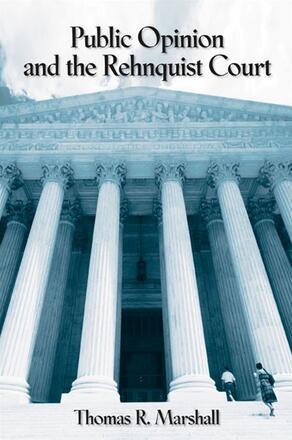
Public Opinion and the Rehnquist Court
Alternative formats available from:
Examines the complex relationship between American public opinion and the U. S. Supreme Court.
Description
Public Opinion and the Rehnquist Court offers the most thorough evidence yet in favor of the U. S. Supreme Court representing public opinion. Thomas R. Marshall analyzes more than two thousand nationwide public opinion polls during the Rehnquist Court era and argues that a clear majority of Supreme Court decisions agree with public opinion. He explains that the Court represents American attitudes when public opinion is well informed on a dispute and when the U. S. Solicitor General takes a position agreeing with poll majorities. He also finds that certain justices best represent public opinion and that the Court uses its review powers over the state and federal courts to bring judicial decision making back in line with public opinion. Finally, Marshall observes that unpopular Supreme Court decisions simply do not endure as long as do popular decisions.
Thomas R. Marshall is Professor of Political Science at the University of Texas at Arlington. He is the author of Presidential Nominations in a Reform Age and Public Opinion and the Supreme Court.
Reviews
"…a data-rich piece of research … one cannot help but admire Marshall's efforts to assemble rigorous and systematic data on such an important question of law and politics. " — Public Opinion Quarterly
"This is a book well worth reading by anyone interested in the linkage between public opinion and political institutions. Thomas Marshall has assiduously mined the archive of public opinion data. The strength of his analysis is in the breadth of what he undertakes. " — Judicature
"The book is full of interesting facts about the Court … [and] would be a welcome addition to any undergraduate political science course on public opinion, the judicial process, or a specialized course examining linkages between institutions and the public. " — Law and Politics Book Review
"…Marshall concludes that the Rehnquist Court, like its recent predecessors, was a majoritarian institution. Marshall examines an exhaustive list of variables to account for this alignment. " — CHOICE
"This is an excellent, well-written, and important book. Not only is it comprehensive in its examination of opinions rendered by the Supreme Court, but it is also comprehensive with respect to the relevant literature produced by Supreme Court scholars and with a clear understanding of said literature. " — Charles D. Hadley, coauthor of Women's PACs: Abortion and Elections
"Marshall constructs a well-developed set of models, which are effectively used for organizing previous studies and as the framework for his own research. This is an important addition to the fields of 'law and courts' and public opinion. " — Stephen L. Wasby, author of The Supreme Court in the Federal Judicial System